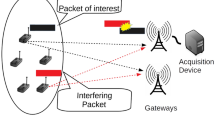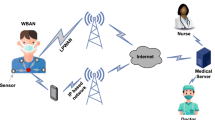Abstract
The control and scheduling for wireless networked control system with packet dropout and disturbance are investigated. A prediction based event triggered control is proposed to reduce data transmissions while preserving the robustness against external disturbance. First, a trigger threshold is especially designed to maintain the difference of the estimated and actual states below a proper boundary when system suffers from packet dropout. Then a predictive controller is designed to compensate for packet dropouts by utilizing the packet-based control approach. The sufficient conditions to ensure the closed-loop system being uniformly ultimately bounded are derived, with consequently the controller gain method. Numerical examples illustrate the effectiveness of the proposed approach.
Similar content being viewed by others
References
Heemels W P M H, Teel A R, van de Wouw N, et al., Networked control systems with communication constraints: Tradeoffs between transmission intervals, delays and performance, IEEE Transactions on Automatic Control, 2010, 55(8): 1781–1796.
Li M and Lin H J, Design and implementation of smart home control systems based on wireless sensor networks and power line communications, IEEE Transactions on Industrial Electronics, 2014, 62(7): 4430–4442.
Zhang X M, Han Q L, and Yu X, Survey on recent advances in networked control systems, IEEE Transactions on Industrial Informatics, 2015, 12(5): 1740–1752.
Ma C, Li T, and Zhang J, Consensus control for leader-following multi-agent systems with measurement noises, Journal of Systems Science & Complexity, 2010, 23(1): 35–49.
Ma C and Zhang J, On formability of linear continuous-time multi-agent systems, Journal of Systems Science & Complexity, 2012, 25(1): 13–29.
Qin J, Ma Q, Gao H, et al., On group synchronization for interacting clusters of heterogeneous systems, IEEE Transactions on Cybernetics, 2017, 47(12): 4122–4133.
Qin J, Zhang G, Zheng W X, et al., Adaptive sliding mode consensus tracking for second-order nonlinear multiagent systems with actuator faults, IEEE Transactions on Cybernetics, 2019, 49(5): 1605–1615.
Park P, Ergen S C, Fischione C, et al., Wireless network design for control systems: A survey, IEEE Communications Surveys Tutorials, 2018, 20(2): 978–1013.
Xia Y Q, Gao Y L, Yan L P, et al., Recent progress in networked control systems — A survey, International Journal of Automation and Computing, 2015, 12(4): 343–367.
Pajic M, Sundaram S, Pappas G J, et al., The wireless control network: A new approach for control over networks, IEEE Transactions on Automatic Control, 2011, 56(10): 2305–2318.
Araujo J, Mazo M, Anta A, et al., System architectures, protocols and algorithms for aperiodic wireless control systems, IEEE Transactions on Industrial Informatics, 2013, 10(1): 175–184.
Li M and Lin H J, Design and implementation of smart home control systems based on wireless sensor networks and power line communications, IEEE Transactions on Industrial Electronics, 2015, 62(7): 4430–4442.
Demir U and Ergen S C, Arima-based time variation model for beneath the chassis uwb channel, EURASIP Journal on Wireless Communications and Networking, 2016, 2016(1): 178–188.
Park P, Arajo J, and Johansson K H, Wireless networked control system co-design, 2011 International Conference on Networking, Sensing and Control, 2011, 486–491.
Tiberi U, Fischione C, Johansson K, et al., Energy-efficient sampling of networked control systems over IEEE 802.15.4 wireless networks, Automatica, 2013, 49(3): 712–724.
Mazo M and Tabuada P, Decentralized event-triggered control over wireless sensor/actuator networks, IEEE Transactions on Automatic Control, 2011, 56(10): 2456–2461.
Han D, Cheng P, Chen J, et al., An online sensor power schedule for remote state estimation with communication energy constraint, IEEE Transactions on Automatic Control, 2014, 59(7): 1942–1947.
Shi L, Cheng P, and Chen J, Sensor data scheduling for optimal state estimation with communication energy constraint, Automatica, 2011, 47(8): 1693–1698.
Shi L and Xie L, Optimal sensor power scheduling for state estimation of gaussmarkov systems over a packet-dropping network, IEEE Transactions on Signal Processing, 2012, 60(5): 2701–2705.
Wang L, Guo G, and Zhuang Y, Stabilization of ncss by random allocation of transmission power to sensors, Science China Information Sciences, 2016, 59(6): 067201.
Wen S, Guo G, Chen B, et al., Transmission power scheduling and control co-design for wireless sensor networks, Information Sciences, 2018, 422: 114–127.
Wang L, Guo G, and Zhuang Y, Networked control of battery-powered systems with communication scheduling and power allocation, International Journal of Robust and Nonlinear Control, 2017, 27(17): 3488–3507.
Astrom K J and Bernhardsson B, Comparison of periodic and event based sampling for first-order stochastic systems, Proceedings of the 14th IFAC World Congress, Citeseer, 1999, 11: 301–306.
Garcia E and Antsaklis P J, Model-based event-triggered control for systems with quantization and time-varying network delays, IEEE Transactions on Automatic Control, 2013, 58(2): 422–434.
Wang X and Lemmon M D, Event-triggering in distributed networked control systems, IEEE Transactions on Automatic Control, 2011, 56(3) 586–601.
Wu W, Reimann S, Gorges D, et al., Event-triggered control for discrete-time linear systems subject to bounded disturbance, International Journal of Robust and Nonlinear Control, 2016, 26(9): 1902–1918.
Xing M and Deng F, Event-triggered sampled-data consensus of nonlinear multi-agent systems with control input losses, Journal of Systems Science & Complexity, 2018, 31(6): 1469–1497.
Heemels W P M H, Donkers M C F, and Teel A R, Periodic event-triggered control for linear systems, IEEE Transactions on Automatic Control, 2013, 58(4): 847–861.
Heemels W P M H, Johansson K H, and Tabuada P, An introduction to event-triggered and self-triggered control, 2012 IEEE 51st IEEE Conference on Decision and Control (CDC), 2012, 3270–3285.
Peng C and Yang T C, Event-triggered communication and H∞ control co-design for networked control systems, Automatica, 2013, 49(5): 1326–1332.
Peng C and Zhang J, Event-triggered output-feedback H∞ control for networked control systems with time-varying sampling, IET Control Theory Applications, 2015, 9(9): 1384–1391.
Yue D, Tian E, and Han Q, A delay system method for designing event-triggered controllers of networked control systems, IEEE Transactions on Automatic Control, 2013, 58(2): 475–481.
Abdelrahim M, Postoyan R, Daafouz J, et al., Co-design of output feedback laws and event-triggering conditions for linear systems, 53rd IEEE Conference on Decision and Control, 2014, 3560–3565.
Fu W, Yang S X, Huang C, et al., Predictive triggered control for networked control systems with event-triggered mechanism, Cluster Computing, 2019, 22: 10185–10195.
Yang H, Guo X, Dai L, et al., Event-triggered predictive control for networked control systems with network-induced delays and packet dropouts, International Journal of Robust and Nonlinear Control, 2018, 28(4): 1350–1365.
Zhao Y, Liu G, and Rees D, Modeling and stabilization of continuous-time packet-based networked control systems, IEEE Transactions on Systems, Man, and Cybernetics, Part B (Cybernetics), 2009 39(6): 1646–1652.
Blanchini F, Ultimate boundedness control for uncertain discrete-time systems via set-induced lyapunov functions, IEEE Transactions on Automatic Control, 1994, 39(2): 428–433.
Author information
Authors and Affiliations
Corresponding author
Additional information
This work was supported in part by the National Natural Science Foundation of China under Grant No. 61673350, and in part by the Major Projects Foundation of Zhejiang under Grant No. 2017C03060.
This paper was recommended for publication by Editor SUN Jian.
Rights and permissions
About this article
Cite this article
Zhao, Y., Pan, X. & Yu, S. Predictive Event-Triggered Control for Disturbanced Wireless Networked Control Systems. J Syst Sci Complex 34, 1028–1043 (2021). https://doi.org/10.1007/s11424-020-9317-3
Received:
Revised:
Published:
Issue Date:
DOI: https://doi.org/10.1007/s11424-020-9317-3




